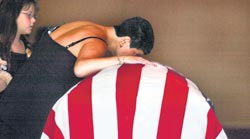
Republican rats leaving Bush’s sinking shipNEW YORK - A hilarious cartoonish comedy titled "Ratatouille," an outlandish spoof of a mouse that aspires to be a chef in an elitist French restaurant, has elevated the long-despised rodent to new heights in Hollywood cinema as it rakes in massive dollars at the box office. But that celluloid fantasy has not undermined the longstanding metaphor of a rat as a renegade and a turncoat in the realm of politics. When the Bush administration drew support from ruling Republican politicians and neo-conservatives for its predictably disastrous war in Iraq, one cynic remarked that it was perhaps one of the few occasions in political history that rats were swimming towards a sinking ship.
But five years after the war, the original metaphor is back in vogue: the rats, after all, are now leaving a sinking ship, this time it's the ship of state in Washington DC. Voting on party lines, Republican politicians have consistently maintained strong support for President Bush's policies on Iraq. But that solid support is continuing to erode as an increasingly large number of Americans are demanding a strategic change in policy, including a phased withdrawal of troops, according to nation-wide polls. The poll numbers are causing jitters in Capitol Hill where legislators sit and decide on the fate of the nation. Among Republican politicians, the first to break away from the pack was Senator John Warner of Virginia, a member of the Senate Armed Services Committee, who changed his mind after eight visits to the battle front in Iraq and the heavily-fortified Green Zone in Baghdad. But now three other key Republican Senators, all of them onetime steadfast supporters of the Bush policy on Iraq, have decided to leave a political Titanic on the verge of sinking. Senator Richard Lugar of Indiana, a ranking member of the Senate Foreign Relations Committee and the second key Republican to abandon Bush, says the costs and risks of continuing down the current path outweigh the potential benefits that might be achieved. A third Republican Senator, George Voinovich of Ohio, also a member of the Foreign Relations Committee, says the US is running out of time in Iraq. "A policy of responsible military disengagement, with a corresponding increase in non-military support, is the best way to advance our nation's interests in Iraq and achieve our primary goals." Last week, Senator Pete Domenici of New Mexico, a member of the Defense Appropriations Sub-Committee, became the fourth Republican to openly challenge the Bush administration on Iraq. But Domenici argued that since the US-installed Iraqi government has continued to fail in its political mission, it is time for the US to call it quits. "We've all been, to one degree or another, disappointed in the Iraqi government. They have not been able to do on the political side what they told us they would try to achieve." With the death toll of US soldiers exceeding 3,500 by the end of last week and an astronomically rising number of Iraqi civilian deaths and casualties, the US public has largely concluded that the Iraq war is a monumental disaster both for the Americans and the Iraqis. The change among Republican politicians is also prompted by fears that Iraq will once again be a hot political issue at the upcoming Congressional elections in November and the presidential elections next year. At least two Senators, Warner and Domenici, are up for re-election and possibly facing a strong backlash from their constituents. Last year the opposition Democratic Party was able to make significant gains-- particularly in elections to the House of Representatives — because of their opposition to the war. The House of Representatives is already under the control of Democrats. But their attempts to cut funding for the war have been stymied by the Senate which still commands a razor-thin Republican majority. Speaking to reporters last week, Domenici said his decision to withdraw unqualified support for Bush was prompted primarily by families in his state of New Mexico who had lost their sons in Iraq. "I heard nothing like that a couple of years ago," he said, "I think that's the result of this war dragging on almost indefinitely." |
|| Front
Page | News | Editorial | Columns | Sports | Plus | Financial
Times | International | Mirror | TV
Times | Funday
Times || |
| |
Copyright
2007 Wijeya
Newspapers Ltd.Colombo. Sri Lanka. |
